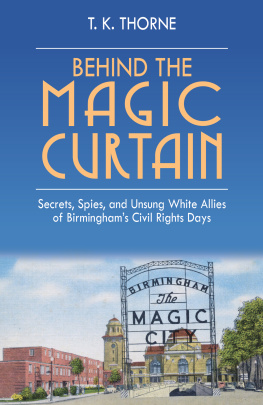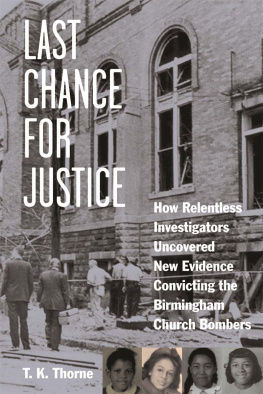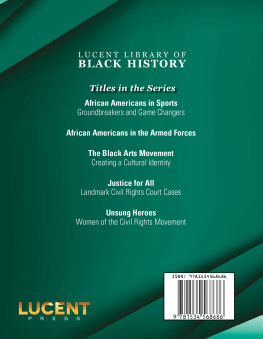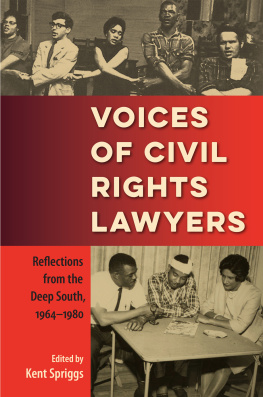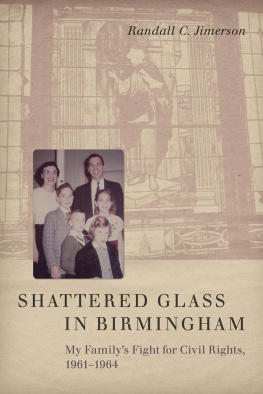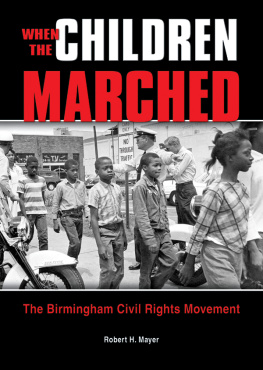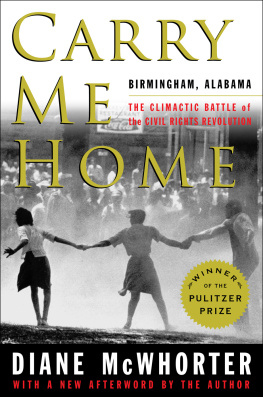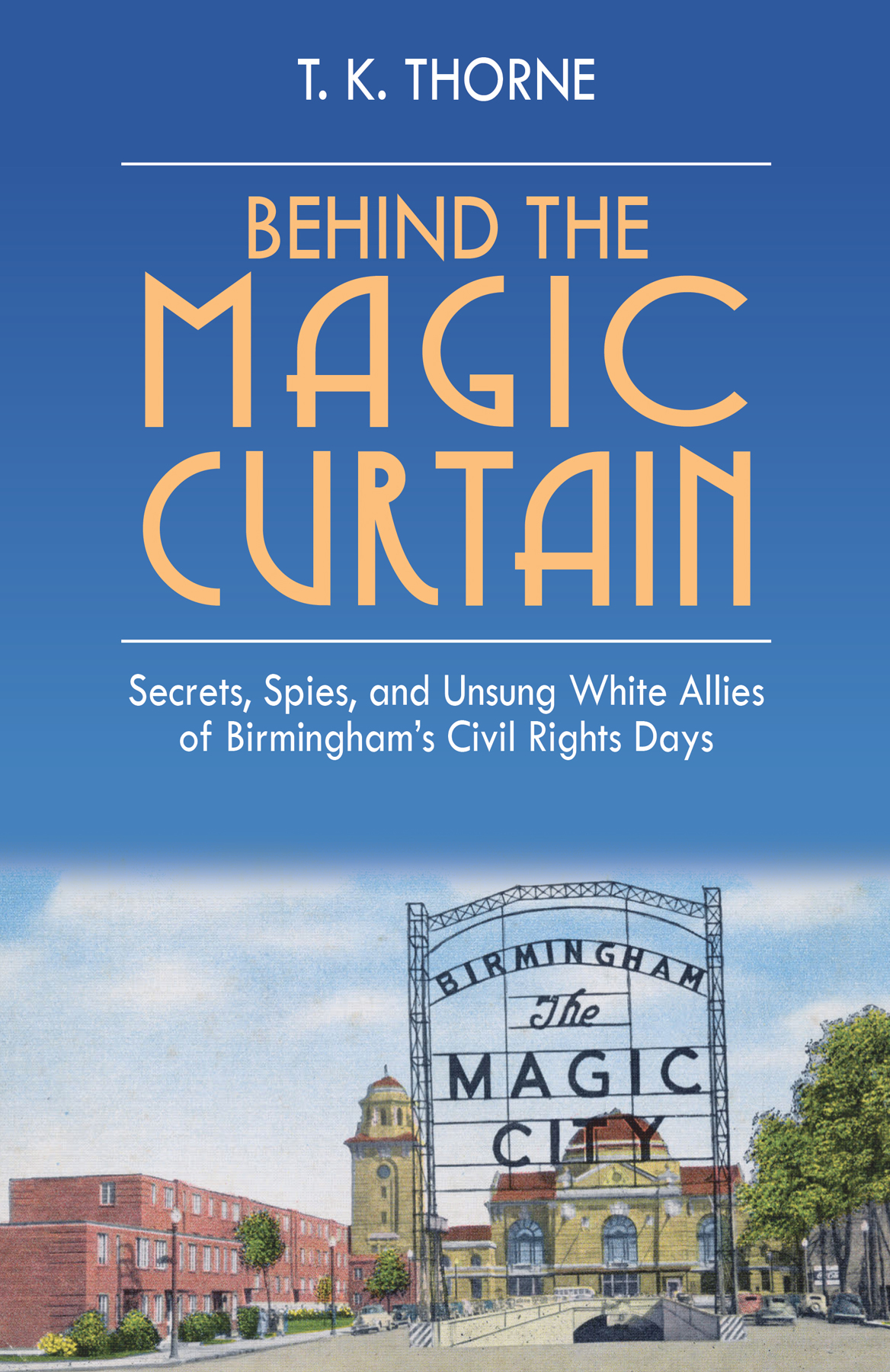Table of Contents
Guide
BEHIND THE MAGIC CURTAIN

ALSO BY T. K. THORNE
FICTION
Noahs Wife
Angels at the Gate
House of Rose: A Magic City Story
NONFICTION
Last Chance for Justice: How Relentless Investigators Uncovered
New Evidence Convicting the Birmingham Church Bombers

NewSouth Books
105 S. Court Street
Montgomery, AL 36104
Copyright 2021 by T. K. Thorne
All rights reserved under International and Pan-American Copyright Conventions.
Published in the United States by NewSouth Books, Montgomery, Alabama.
Publishers Cataloging-in-Publication Data
Names: Thorne, T. K., author.
Title: Behind the magic curtain: Secrets, spies, and unsung white allies of Birminghams civil rights days / T. K. Thorne.
Description: Montgomery : NewSouth Books [2021]. | Includes bibliographical references and index.
Identifiers: LCCN 2021930748 | ISBN 9781588384409 (hardcover) | ISBN 9781588384430 (ebook).
Subjects: Journalists and editorsCivil rights movementBiography. | Law enforcementCivil rights movementBiography. | Civil rights movementHistoryUnited States. | 20th centuryHistoryUnited States. | SouthHistoryUnited States. | AlabamaHistoryUnited States. I. Title.
Design by Randall Williams
Printed in the United States of America by Sheridan

| The Black Belt, defined by its dark, rich soil, stretches across central Alabama. It was the heart of the cotton belt. It was and is a place of great beauty, of extreme wealth and grinding poverty, of pain and joy. Here we take our stand, listening to the past, looking to the future. |
To my family,
who provided the air of civil and human rights
I breathed in my youth, and to those who loved and love
Birmingham with all her scars, tragedies, and triumphs.
Blessed are the peacemakers, for they shall catch hell from all sides.
SIGN IN THE OFFICE OF BURKE MARSHALL, HEAD OF ROBERT KENNEDYS CIVIL RIGHTS DIVISION
Its reputation as a bastion of hard-line segregation notwithstanding, Birminghams social and political atmosphere was complex.
SOL KIMERLING, BIRMINGHAM HISTORIAN
There were a lot of white people who were with us. Everybody white is not bad and everybody black is not good.
NIMS DADDY GAY, CIVIL RIGHTS MOVEMENT LEADER
Events in Birmingham changed the world.
BILL BAXLEY, FORMER ALABAMA ATTORNEY GENERAL AND LIEUTENANT GOVERNOR
Contents
This book has been the better part of a decade in the making. I was asked to write it by four men who loved Birmingham and wanted to pull aside the Magic Citys curtain to tell the untold or forgotten stories of those who worked for peace and racial progress under extraordinary circumstances in extraordinary times. The four were Bill Thomason, Karl Friedman, Doug Carpenter, and Tom Lankford. I was hesitant, but after reading some of Tom Lankfords memoir notes about his whirlwind newspaper career in the heart of historic happenings in the city, I agreed. Lankford and Friedman, in particular, were generous with their time and sharing their experiences and memories. Without their input, this book would not have been possible. I have preserved many of their turns of phrase.
It is a great sadness to me that Friedman, Thomason, and Lankford passed away before seeing the published book. I hope I have done some justice to their vision.
Although this work is based on interviews, personal memos, video recordings, and historical documentation, a dominant narrative voice follows the perspective of Lankford. As a young reporter for the Birmingham News embedded with law enforcement by assignment and his own initiative, Lankford was on the scene and behind the scenes on almost all major civil rights happenings in Alabama during the era. Driven by a desire to get the scoop and provide information needed in an extraordinary time, he had his hand in some capers of questionable ethics. He didnt question them at the time and is disclosing them now in the name of telling truths about what happened. His unique perspective and stories reveal an untold layer to historical events. That I have relied extensively on his memories and notes does not mean that I endorse all his methods or actions.
ACKNOWLEDGMENTS
A sincere thank-you to those who have read the manuscript, multiple times for some, and offered invaluable assistance over the yearsEarl Tilford, author and historian; Stephen Edmondson, lore-keeper extraordinaire; Sol Kimerling, local historian, writer, and early mentor; Dan Waterman at the University of Alabama Press, also a mentor and champion of this story; the Reverend Doug Carpenter, son of Bishop C. C. J. Carpenter; Anthony Grooms, author and professor of creative writing at Kennesaw State University; Captains Juanita Eaton and Jennifer Kilburn; Donna Dukes, for tireless efforts to connect me with civil rights icons; and Dana Thomas and Jennifer Buettner at the Birmingham Bar Association. Thanks also to readers who shared their thoughts and supportOdessa Woolfolk, educator and community activist; Jack Drake, civil rights attorney and advocate; Dr. Terry Barr, author and director of creative writing at Presbyterian College; Debra Goldstein, author and retired federal judge; Richard Friedman, community leader; and community volunteer and leader Fran Godchaux.
Also, my sincere appreciation to all who helped on my hunt for photographs and those who gave me their time for personal interviews. The latter are too numerous to mention here but appear in the bibliography. A special thanks, as well, to Pam Powell, for access to raw footage of her video interviews for a film series on this subject; Mark Kelley for his video interview footage on Karl Friedman and Betty Loeb; Jeanne Weaver, for access to her manuscript, now a book, on the history of the Unitarian Church in Birmingham; Janet Griffin, Virginia Volker, Elaine Hobson Miller, Sol Kimerling, Shannon Webster, Sam Rumore, Harriet Schaffer, Chervis Isom, and Robert Vance Jr. for sharing their priceless papers; Alice Westerly for digging up old documents on the Community Affairs Committee; Wayne Coleman, archives director, and Laura Anderson, former archives director at the Birmingham Civil Rights Institute; James L. Baggett and Don Veasey and Catherine Oseas of the Birmingham Public Library; Monika Singletary of Temple Emanu-El; my wonderful agent, Kimberley Cameron, who kept believing in this story; Joe Taylor of Livingston Press at the University of West Alabama who took the book under his wing; and, of course, the amazing shepherds at NewSouth Books, Suzanne La Rosa and Randall Williams.
Most of all, I thank my husband, friend, and first-editor Roger Thorne for his love and support and putting up with the time and attention required for such a project.
Much of the truth of Birmingham in the civil rights era is ugly, plain and simple. This book is not an attempt to revise that truth. The darkness, however, is always what allows the light. And in Birminghams darkness, individual lights grewsome from shades of gray that bloomed into sparks, some lanterns of courage. Painfully and slowly, in tandem with economic forces, judicial justice, labor law reform, and street demonstrations, they led the way out. These stories about the darkness and the shades of light in a city that literally brought change to the world are needed, perhaps now more than ever.
Next page
